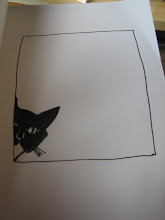As a lover of fantasy writing I'm a little surprised that I've only read this book so very recently. I love the film of The Wizard of Oz, perhaps the most glorious example of the magical possibilities of Technicolor, and my childhood was haunted by the utterly terrifying 1980s sequel
Return to Oz (not a children's film, in my opinion!) I've always been obsessed with red glitter heels (and am the proud owner of
my own pair).
The truth is, I've picked up
Wicked on many a bookshop-browsing trip. I could feel myself getting drawn in each time I did, but I put it down because I wanted to save it for a special occasion. I read all the time, for work and play, but rarely get the opportunity to read just one novel for pleasure from morning to evening, days in a row. That is a treat I only get when I'm on holiday or set aside time for myself.
So I picked this book to read over Christmas. I ended up being both happy and slightly rueful with my choice.
I've not read the original book of The Wizard of Oz, so I perhaps don't get all the intricacies of Maguire's rewriting. But I was truly captivated by his vision of Oz and world beyond, a raw, cruel, unjust world, yet not without its own primitive magic. The character Elphaba, the "Wicked Witch of the West" is rendered as a complex, embattled figure, both intensely sympathetic and at times incredibly frustrating as a protagonist. The story is a powerful allegory on the nature of 'wickedness' (political corruption, abuse of discrimination of Others, betrayals by loved ones) and the experience of being Other in a strictly ordered society. The novel wears its intentions on its sleeve - breaking off to ruminate at points on the possibility of redemption, of the nature of sin, and the role of religion. I sighed a bit at these points (I don't like novels that spell things out for me) but I wasn't excessively put off by it, because I was very intrigued as to where Maguire was taking his story.
There are many strands to Maguire's ambitious novel, both in terms of plot and theme. It is a disjointed, fragmented affair - the story jumps about in time and space, with only Elphaba holding the thing together. As I read further on and the pages remaining began to diminish, I started to feel increasingly uneasy. How was he going to resolve all the many stories he had started? How would everything fit in place? WHERE WAS DOROTHY?
The last tenth of this novel is frenetic. Dorothy arrives, worlds fall apart, old lost friends reappear or cannot, and Elphaba starts to find out who she is. You can almost feel Maguire's desperation to finish (perhaps for an overbearing publisher?) and of course it doesn't realise the scale of its initial ambition. Yet in many ways this is a novel about failure and disappointment, so this is strangely apt.
It's a powerful, tragic and moving novel. It goes to the painful heart of the original story of Oz (a story after all of not belonging, of feeling inadequate, of the grief and terror of losing home and family), and lays it bare. (It's partly why I was rueful about reading this over the holidays: it's not the cosiest of holiday reads!) Maguire's imagining of Elphaba is one of the best female fantasy protagonists I've read in a while: brittle, brave, vulnerable and awe-inspiringly strong and defiant.
I enjoyed this novel very much, but like its protagonist it is not without its flaws. I recommend it on that basis, for patient readers who appreciate fantasy stories for the journey as much as the final destination.
On a final note, I'm going to see the musical soon. I'm very intrigued to know how they've adapted the novel!

The book does sound interesting but i really didn't like the musical. I think I just don't like the basic premise, that the wicked witch wasn't really wicked. I just think it's a bit cliched and things. But then I've heard the books really well written, so maybe i should just shut up :P
ReplyDeleteAnyway thank you for the review, it was very interesting!